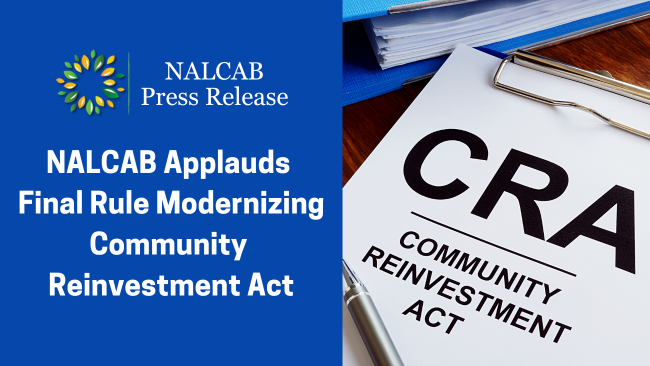
Dear Chairman Powell, Vice Chairman Clarida, Governor Brainard, Vice Chairman Quarles and Chairman McWilliams:
We are writing to express our deep concern about the Office of the Comptroller of Currency’s (OCC) Advance Notice of Proposed Rulemaking (ANPR) regarding the Community Reinvestment Act (CRA), which was recently released without the participation of the Federal Reserve nor the Federal Deposit Insurance Corporation (FDIC).
The CRA has been critical for requiring depository institutions to meet credit needs in the communities they serve. It was a landmark response to red-lining practices that targeted communities of color, and which continue to this day. It is a fundamental financial pillar of the community and economic development sector. In the wake of the recent tax reform that produced windfall profits for banks, the CRA is needed now more than ever to ensure equitable investment in low- and moderate communities and address a widening wealth gap.
The approach described in the ANPR will lower the bar for CRA compliance and reduce investment in low-and moderate-income communities. The OCC’s ANPR opens the door to numerous troubling approaches to watering down the obligation that banks have under the Community Reinvestment Act. Perhaps most concerning is the simplistic “one ratio” approach to CRA ratings proposed in the ANPR under which banks would only report the top line amount of CRA investments as a percentage of total assets, eliminating the vast majority of CRA requirements. This approach is designed to lower the bar for compliance and limit opportunities for community input into the rating process. It would enable banks to seek out the lowest risk, and highest margin investments, thereby undermining the CRA’s focus on LMI communities and people. The result would be a dramatic reduction in total community reinvestment by the banking industry – a windfall for banks at the expense of the communities they are required to serve under the CRA.
The Comptroller has given testimony about how, as CEO of One West Bank, he found it very difficult to comply with CRA. With more than 96% of banks receiving a satisfactory or better rating, it does not appear that the banking industry is having a very difficult time meeting the existing standards. There is no reasonable argument that the bar for CRA compliance needs to be lowered, and reducing the focus on LMI communities is contrary to the intent of the law.
The ANPR and the OCC’s approach to CRA reform is fundamentally flawed and any resulting regulatory revisions will be subject to ongoing question and revision. The ANPR ignores a decade or more of work around strengthening CRA’s impact. In collaboration with the OCC and FDIC, the Federal Reserve has been engaged in a multiyear process aimed at reforming the CRA to more effectively meet the credit needs of our nation’s diverse communities and respond to the evolution of the financial services industry. In May 2016, the Federal Reserve solicited advice on CRA reform from the Community Advisory Council. Interagency Q&As were published in July 2016. Governor Brainard has recently made speeches addressing CRA Reform which outlined specific guideposts that reflect a balance of input from industry and community-serving organizations and that represent a step forward in this discussion that intentionally builds on a robust process.
The evolution of the banking sector, and especially technological change that has transformed the delivery of financial services, has created the opportunity for the CRA to have even greater impact in the communities it was originally intended to serve. There is a need to undertake CRA reform that puts the credit needs of low- and moderate communities first. Reform must also take into account the increased capacity and sophistication of the community development field. In frequent public statements, the Comptroller has conflated legitimate interest in CRA reform with support for his agenda. In fact, objections the Comptroller’s approach to CRA are widespread.
- On May 25, fifteen US Senators felt the need to express their concern that an advance notice of rulemaking would soon be published regarding the CRA and encouraged you to, “avoid proposals that could undermine the continuing effectiveness of the CRA.”
- A coalition of national and regional organizations representing consumers, communities of color and the community development industry sent a letter in June to Chairman Powell raising concerns about the Comptroller’s intent to undermine the CRA. Ranking member Congresswoman Maxine Waters released this statement expressing “great concern” about the ANPR when it was released.
- The National Community Reinvestment Coalition authored an opinion piece in the New York Times that correctly warns against the Comptroller’s approach to CRA reform.
- The California Reinvestment Coalition released a statement reflecting the concern of its membership about the ANPR.
The ANPR process initiated by the OCC is fundamentally flawed and lacks credibility. The Comptroller’s public statements since his confirmation reflect an intent to minimize public input while amplifying special interests within the financial services industry. The Comptroller has described banks as the OCC’s customers and places more emphasis on how CRA affects banks rather than how it meets the credit needs of consumers and strengthens communities. Further, by “going it alone” the OCC is undermining the CRA by creating uncertainty and inconsistency among the regulators in their approach to CRA. In a time when the President of the United States has called out the Chairman of the Federal Reserve by name to object to the Federal Reserve system’s monetary policy stance, it is highly inappropriate for the Comptroller of the Currency to take actions aimed at strong-arming colleagues at the Federal Reserve and the FDIC.
The stakes in this conversation are high. If the one ratio approach is adopted, it will undermine safeguards on the financial services sector and the mission of the CRA, resulting in ripple effects on the funding and financing structures of most of our nation’s socially-motivated infrastructure, from affordable housing to education to community health and more.
The Federal Reserve and the FDIC should not join this flawed process and should actively encourage the OCC to withdraw the ANPR.
Respectfully submitted,
Americans for Financial Reform
California Reinvestment Coalition
Center for Popular Democracy’s Fed Up Campaign
Center for Responsible Lending
Chicanos Por La Causa
Community Council of Idaho
Community Reinvestment Alliance of South Florida
The Greenlining Institute
Hispanic Interest Coalition of Alabama
IBA – Inquilinos Boricuas en Acción
National Alliance of Community Economic Development Associations (NACEDA)
NALCAB – National Association for Latino Community Asset Builders
National Coalition for Asian Pacific American Community Development
NEW Economics for Women
PolicyLink
Prosperity Now
TELACU
Texas Appleseed
Related Posts
October 27, 2023 at 08:18 pm
NALCAB Applauds Final Rule Modernizing Community R ...Posted by Hallie Chavez
...
October 12, 2023 at 07:32 pm
NALCAB Joins First-Ever Coalition Applying for EPA ...Posted by Sharon Garcia
...
September 08, 2023 at 04:11 pm
NALCAB Applauds Historic Confirmation of Kugler, t ...Posted by Sharon Garcia
...
July 28, 2023 at 02:36 pm
NALCAB Condemns Resolution to Gut Section 1071Posted by Sharon Garcia
...








